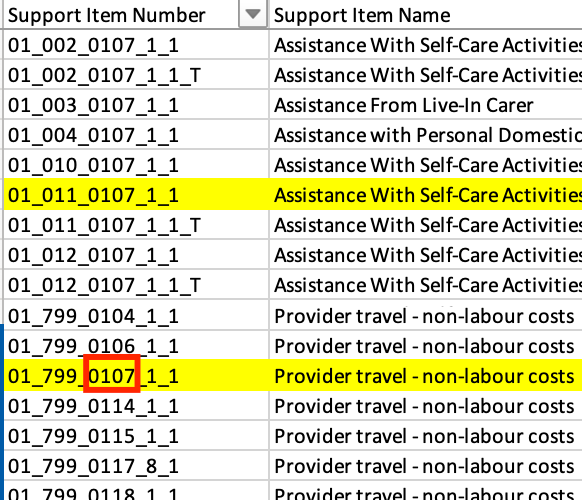
NDIS providers of support can charge for the cost of travel when:
-
They spend time accompanying participants for community access (CORE) OR
-
They spend time travelling to a participant to deliver face to face supports OR
- They incur non face-to-face/labour travel costs - parking, tolls, running costs of vehicle etc.
NOTE: The participant must agree to this before the service is delivered and it should be stated in the Service Agreement.
1. NDIS support worker accompanying Participants for Community Access
A participant may need a support worker to accompany them on a community outing and/or transport them from their home to the community (and back).
The time the support worker spends transporting them can be claimed at their agreed hourly rate.
For example:
A support worker drives you to a community activity which is 30 min away. The time spent at the activity is 2 hours. They then drive you home again afterwards.
The total amount used from the NDIS plan is 3 hours @ support worker hourly rate (2 hours support plus 1 hour total driving time).
This amount is claimed from the relevant Assistance with social and community participation support item in the participant’s CORE budget.
NOTE: If more than one participant travelling the cost is apportioned between the multiple participants.
Additional transport cost when accompanying participants for Community Access (CORE budget)
- If a support worker incurs extra 'non labour' costs, they can charge a participant for these costs.
- Extra non-labour costs may be:
- the cost of a ticket for public transport
- road tolls
- parking fees
- the running costs of the vehicle
- IMPORTANT: Again, a participant has to agree to pay these amounts first, so providers will need to discuss it upfront - your service agreement should cover this.
- This amount is claimed in the Portal under Assistance with Social and Community participation > Activity Based Transport in the CORE section of their plan.
Additional transport cost for Capacity Building Supports (CAPACITY BUILDING budget)
- A participant can also pay providers of the following capacity-building line items for Activity Based Transport when they are delivering their supports:
- Finding and keeping a job
- Improved learning
- Improved living arrangements
- Increased social and community participation (cost of the activity)
- Improved relationships
- Example: include supermarket trips with a support worker, going to the footy with a support worker or going for a coffee with a support worker.
- This amount can be claimed from the relevant CAPACITY BUILDING support item. For example:

2. NDIS Support Workers travelling to a participant to provide face to face supports
Face to face costs
Providers can only claim travel costs if ALL of the following conditions are met:
- the NDIS Support Catalogue shows Travel is allowed to be claimed. There should be a Y in the 'Provider Travel' column in the NDIS Support Catalogue:

- the travel charge complies with pricing guides from the NDIS (I.e cannot charge more than allowed)
- the travel is necessary in order to deliver a specific disability support item to that participant
- the support is delivered face-to-face to the participant
- the provider explains the travel charge and why it is a good use of the participant's funds
- the provider has the participant's agreement that travel costs can be claimed and the amount that can be claimed
- the provider is required to pay the worker delivering the support for the time they spent travelling
OR the provider is a sole trader and is travelling from their usual place of work to or from the participant, or between participants.
How much can a provider charge for Travel?
The maximum amount of travel time a provider can claim for the time spent travelling TO each participant (for each eligible worker) is:
- 30 minutes in MMM1-3 areas
- 60 minutes in MMM4-5 areas
- In remote areas providers may enter specific arrangements with participants to cover travel costs, up to the relevant hourly rate for the support item.
Providers delivering Core supports can claim for the time spent travelling from the last participant to their usual place of work. Again the same maximum rates apply.
What happens when a Support Worker is supporting more than 1 participant?
Where a worker is travelling to provide services to more than one participant in a ‘region’ then the provider should apportion that travel time (including the return journey where applicable) between the participants.
Participants need to agree to this in advance.
How does a Support Worker bill for travel time?
The time spent travelling to or from a participant must be claimed separately to the claim for the primary support.
Invoices should show the support hours and the travel hours separately as they use different line items.
Charge the travel separately using the matching provider travel line item number in the NDIS Support Catalogue.
You will see the pattern when you look at the support worker line items and the provider travel line items.
Once you know how this works, it's easy. For example:

How much does a Support Worker bill for travel time?
A provider should use the same hourly rate as they have agreed with the participant for the primary support (or a lower hourly rate for the travel if that is what they have agreed with the participant).
3. Non face-to-face (labour) Travel costs
These costs need to be agreed upon by the participant beforehand in the service agreement.
The amount that a participant can pay a provider is not price-controlled, but the NDIS has provided a guide as to what is considered reasonable.
This amount changes with each new price guide. For the latest rates, look at the latest NIDS Price Guide (now called NDIS Pricing Arrangements and Price Limits). It includes:
- an amount per kilometre for a vehicle that is not modified for accessibility
- an amount per kilometre for a vehicle that is modified for accessibility or a bus
- other forms of transport or associated costs up to the full amount, such as road tolls, parking, public transport fares
For example: A support worker drives a Participant to a community activity which:
- is 20km away
- takes them 30 min to drive each away
- the support worker uses their own car that is not modified
- there is a toll cost of $5
- there is a parking cost of $15
- the time spent at the activity is 2 hours
Assume the amount per kilometre for an unmodified car is $0.78. The total amount that can be claimed from their NDIS plan is:
3 hours of support
+ $5 Toll
+ $15 parking
+ $0.85 x 40km running costs
Sources
- NDIS Pricing Arrangements and Price Limits (NDIS Price Guide)
- How much can Therapist/Capacity Building Provider Charge?
NDIS THERAPY FINDER - FREE SERVICE
LET US FIND YOU A SKILLED SUPPORT WORKER


